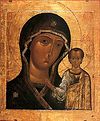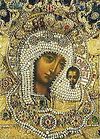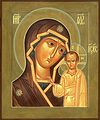

| Previous day | Next day |
| Old Style
October 22
|
Sunday |
New Style
November 4
|
| 23rd Sunday after Pentecost. Tone 6. | No fast.
|
![]() The Kazan Icon of the Most Holy Theotokos (commemorating the deliverance from the Poles in 1612).
The Kazan Icon of the Most Holy Theotokos (commemorating the deliverance from the Poles in 1612). ![]() Holy Equal-to-the-Apostles Abercius, bishop and wonderworker, of Hierapolis (167).
Holy Equal-to-the-Apostles Abercius, bishop and wonderworker, of Hierapolis (167). ![]() The Holy Seven Youths (“Seven Sleepers”) of Ephesus (see August 4) (250 and ca. 446).
The Holy Seven Youths (“Seven Sleepers”) of Ephesus (see August 4) (250 and ca. 446).
Hieromartyr Alexander, bishop, and Martyrs Heraclius, Anna, Elizabeth, Theodota, and Glyceria, at Adrianople (2nd-3rd c.). Sts. Theodore and Paul, abbots, of Rostov (1409).
New Hieromartyrs Seraphim (Samoilovich), archbishop of Uglich, Menas (Shelaev) and Herman (Polyansky), archimandrites, and Alexander Lebedev, Vladimir Sobolev, Basil Bogoyavlensky, and Alexander Andreyev, priests (1937). New Hieromartyr Gregory (Vorobiev), abbot, of Koprino (Yaroslavl) (1937).
Martyr Theodoret, at Antioch (362). Sts. Lot and Rufus, of Egypt (5th c.). St. George the New Confessor, of Drama (Greece) (1959).
Repose of Monk Joseph the Silent, of Kuban (1925), Metropolitan Nestor of Kamchatka and Petropavlovsk (1962), and Protopresbyter Michael Pomazansky (1988).
Thoughts for Each Day of the Year
According to the Daily Church Readings from the Word of God
By St. Theophan the Recluse

Twenty-Second Sunday After Pentecost. [Gal. 6:11-18; Luke 16:19-31]
The parable about the rich man and Lazarus shows that those who do not live as they should will suddenly wake up to reality, but they will no longer have the opportunity to correct their state. Their eyes will open and they will clearly see where the truth lies. Remembering that on the earth there are many who are blind as they were, they would like someone to be sent from the dead for the assurance that one must live and understand things only according to the indication of the Lord’s Revelation. But they will be denied even this, because for those who desire to know the truth, Revelation alone is a witness. But for those who do not desire it, and do not love the truth, even the resurrection of the dead will not be convincing. The feelings of the rich man in this parable are probably felt by everyone who departs this life. Consequently, according to the conviction of that world which will be the conviction of us all, the only guidance for us on the path of life is the Lord’s Revelation. But there, for many, this conviction will have come too late—it would have been more useful here, but not everyone had it. We will believe, at least, the testimony of those there, putting ourselves into their state. Those who are in torments do not lie; pitying us they want our eyes to be opened, that we not come to the place of their torment. We cannot say of this subject as we often do of current affairs, “Maybe somehow things will go all right.” No; it will not just go all right somehow. We must be fundamentally certain that we will not find ourselves in the place of the rich man.






